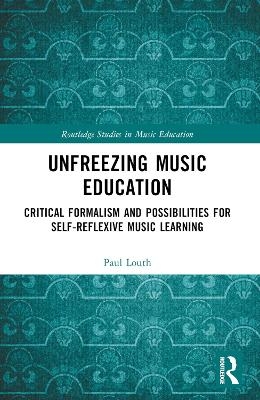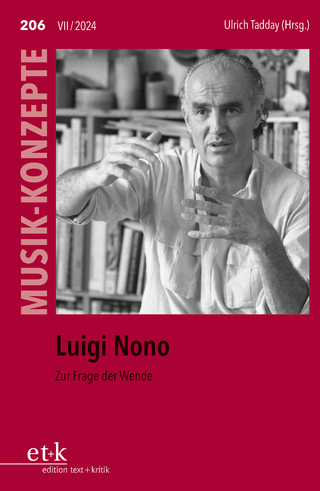
Unfreezing Music Education
Critical Formalism and Possibilities for Self-Reflexive Music Learning
Seiten
2024
Routledge (Verlag)
978-1-032-40600-8 (ISBN)
Routledge (Verlag)
978-1-032-40600-8 (ISBN)
- Lieferbar (Termin unbekannt)
- Versandkostenfrei
- Auch auf Rechnung
- Artikel merken
Unfreezing Music Education argues that discussing the conflicting meanings of music should occupy a more central role in formal music education and music teacher preparation programs than is currently the case.
Drawing on the critical theory of the Frankfurt School, the author seeks to take a dialectical approach to musical meaning, rooted in critical formalism, that avoids the pitfalls of both traditional aesthetic arguments and radical subjectivity. This book makes the case for helping students understand that the meaning of musical forms is socially constructed through a process of reification, and argues that encouraging greater awareness of the processes through which music’s fluid meanings become hidden will help students to think more critically about music.
Connecting this philosophical argument with concrete, practical challenges faced by students and educators, this study will be of interest to researchers across music education and philosophy, as well as post-secondary music educators and all others interested in aesthetic philosophy, critical theory, cultural studies, or the sociology of music and music education.
Drawing on the critical theory of the Frankfurt School, the author seeks to take a dialectical approach to musical meaning, rooted in critical formalism, that avoids the pitfalls of both traditional aesthetic arguments and radical subjectivity. This book makes the case for helping students understand that the meaning of musical forms is socially constructed through a process of reification, and argues that encouraging greater awareness of the processes through which music’s fluid meanings become hidden will help students to think more critically about music.
Connecting this philosophical argument with concrete, practical challenges faced by students and educators, this study will be of interest to researchers across music education and philosophy, as well as post-secondary music educators and all others interested in aesthetic philosophy, critical theory, cultural studies, or the sociology of music and music education.
Paul Louth is Professor of Music Education at Youngstown State University.
1. Introduction 2. Why Form? 3. Music Education and the Objectivity Problem 4. From Consumptive to Critical, Productive Listening 5. Creativity, Critique, and the Freedom Problem (Improvisation, Composition, and Interpretive Performance as Reified Forms) 6. Form and Content: Some 'Higher Altitude' Examples 7. Critical Formalism and Music Teacher Preparation
| Erscheinungsdatum | 16.03.2023 |
|---|---|
| Reihe/Serie | Routledge Studies in Music Education |
| Verlagsort | London |
| Sprache | englisch |
| Maße | 152 x 229 mm |
| Themenwelt | Kunst / Musik / Theater ► Musik ► Musiktheorie / Musiklehre |
| Sozialwissenschaften ► Pädagogik ► Allgemeines / Lexika | |
| Sozialwissenschaften ► Pädagogik ► Bildungstheorie | |
| ISBN-10 | 1-032-40600-3 / 1032406003 |
| ISBN-13 | 978-1-032-40600-8 / 9781032406008 |
| Zustand | Neuware |
| Informationen gemäß Produktsicherheitsverordnung (GPSR) | |
| Haben Sie eine Frage zum Produkt? |
Mehr entdecken
aus dem Bereich
aus dem Bereich
Grundbegriffe, Harmonik, Formen, Instrumente
Buch | Softcover (2021)
Philipp Reclam (Verlag)
CHF 12,90
globalisiertes Komponieren
Buch | Softcover (2023)
edition text + kritik (Verlag)
CHF 74,90


